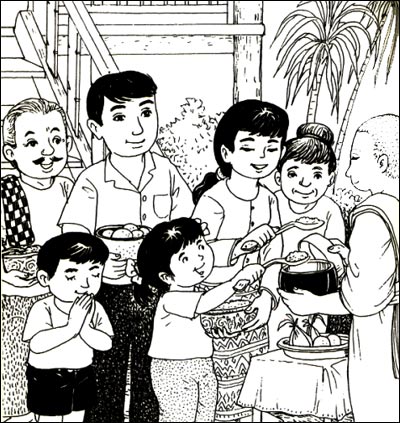Parents, Worthy of Our Reverence
Parents, Worthy of Our Reverence
In 1999, statistics in Thailand showed that the number of elderly people who are being neglected increased by at least 300,000 per year while retirement homes in Thailand can only accommodate an increase of 200 people per year. This is caused by adult children tiring of their elderly parents and the responsibility of caring for them. The increasing trend of elderly people being place in retirement homes is quite a disappointment.
In Buddhist teachings, parents are revered as Arahantas in the family.; They are first teachers to their children. There is a Thai saying that at the parents’ feet are gateways to the heavenly realms. Thai children express their respect and show gratitude to their parents by bowing at their feet. In addition, in their old age, parents should be taken care of by their children. However, nowadays, old parents who are neglected have become a major problem in Thai society where Buddhism is the most common religion.
Our ancestors taught that a person’s success depends upon how well he treats his parents to whom he owns his gratitude. Because their kindness is incomparable, if a person does not realize and appreciate this fact, he will not be gracious to others as well. Whoever neglects their parents, the gateway to the heavenly realms and prosperity will be shut.
Our ancestors remind us of the following important issue. When we look back to our infancy, we could not help ourselves. But if our parents became tired of us and left us in garbage cans or along the roadside, we could never survive our own. Suppose we were to survive, we may have become homeless children who starved and had no future at all. Therefore, because of their help and acceptance of us into their family, our debt of gratitude to them is incomparable. Their kindness is beyond what we can repay. Think for a moment: they sometimes starved and sacrificed for us, so we could be fed. They struggled in every way to raise us into grown adults. For this reason, we must repay our debt of gratitude to them as best as we can.
From the aforementioned scenario, of course, we will become senile and feeble. We may depend on our children for our every movement, even for our trips to the toilet. Our physical bodies will be worn down and this will cause us and our children to feel uneasy. Without gratitude and the true love our children have for us, we may become neglected. However, some are only patiently caring for their parents or grandparents with the expectation of an inheritance. How can we prevent this problem of ungraciousness to those worthy of our reverence?
With great vision and wisdom, our ancestors had clear criteria for solving this problem. Primarily, parents must assign their children to be helpers in caring for their grandparents from the time they are little. As a result, they will automatically bear witness to their parents’ actions. In later life, they will treat their own parents in the same manner as they did with their grandparents.
Also important, to effectively inculcate gratefulness in children, parents must have them participate in caring for their grandparents. Moreover, they must extol must extol their grandparents’ virtues to their children, both in the grandparents’ presence and out of earshot. By setting a good example, children will clearly see and learn from their parents’ acts. Then they will know that a grateful person must treat his parents this way.
On the contrary, those who take care of their parents and complain or curse them at the same time – pr even worse, directly or indirectly abuse their parents – will have children who mentally record these acts and copy them accordingly. The truth is what goes around comes around. When they reach old age, their child will treat them in the same way as they did with their own parents. They will possess the same feelings that their elderly parents had, which are feelings of hurt from not being loved, of being a burden for the family, of not belonging there, and even of feeling inferior to a house-maid. These negative sensations will hurt their hearts in return because of the bad example they had set for their own children.
That means they always accrue merit by offering alms to monks every
morning in order to accumulate provisions for the next life.
Thus, as parents, if you want to be treated well by your children in your later years, you must take good care of your own parents first. At the same time, you must train your children to be good helpers. One day, when they become adults, they will take good care of your as well. You will not be affected or hurt by anything or anyone because your children possess the right understanding of being grateful to you.
Somehow, you have to prepare yourself for old age. Not doing so will bring trouble later because you may be unable to adjust when your physical body becomes weaker. In addition, there may be pressures as a result of your lack of preparation in dealing with these problems.
Now we come to the scheme of how to prepare ourselves to be parents worthy of our children’s reverence. First of all, we must know there are two types of elderly people.
The first type of elderly person is called “A Fruitless Person.” A person of no avail.
These sorts of elderly people have never succeeded in performing good deeds throughout their lives. For instance, they hardly ever offered Dhamma or chanted. It seems like they led unworthy lives day by day. Theses elderly people can be annoying because they lack an understanding of cause and effect or principles of judgment. Their children do not like spending time with them because they create trouble for the family, such as causing the break up between a husband’s mother and her daughter-in-law. Their children are rarely the recipient of any virtuous knowledge from them. Consequently, they will become neglected because they never taught their children how to become grateful people.
The second type of elderly person is called “A Fruitful Person,” a philanthropist or altruist.
Throughout their lives, these elderly people have diligently earned their livelihood, and are well prepared for their elderly years so that they can depend on themselves without help from others. Their behavior and manners are well adjusted; they know that they will not be a burden on their children. In terms of religion, they have diligently studied the Buddhist principles by being generous, observing the precepts, and practicing meditation. Furthermore, they have always taught and instilled their children with the correct understanding of life.
The Lord Buddha called these elderly people “those worthy of their children’s reverence.” A family with a member like this will possess happiness as if it has “a worthy one in the family,”
These elderly people always followed the principles of leading a simple life which include:
1) Doing one’s best to offer alms. That means they always accrue merit by offering alms to monks every morning in order to accumulate provisions for the next life.
2) Doing one’s best to strictly adhere to the Five Precepts every day. This is especially true of the fourth precept (not to lie), of which one should be most aware. On the eve of Buddhist holy days and during Buddhist holy days, they will keep the Eight Precepts. Doing so can reinforece them to lead their lives in a simple way.
3) Doing one's best to meditate frequently. They meditate in the morning, agter lunch, and before bed to keep their mind purified and radiant.
These elderly people behaved well and set good examples for their children. In leisure, they instilled them with a moral education , storytelling, Dhamma-storytelling, and their own life experiences, all of which were valuable and useful for the little ones to follow. These good examples reminded and had an impact on their children, enabling the children to lead their lives in righteous and virtuous ways.
Moreover, these elders will never interfere in their in-laws’ lives. They assume that these adults know how to handle responsibility in a family and to solve problems by themselves. They do not need their parents-in-law to assist in reconcilements. In the end, these adults will take their place and become the next pillar of support for the family.
Later, when the lives of these elderly people come to an end, their possessions will be given to their children. So, they will allow their adult children to be the caretakers of their fortunes. They are well prepared for their own funerals with accumulated savings and will perform final merit-making before their eternal sleep. After the property has been divided, a sum will be given to their children to care for their own family. These elderly people are leading their lives in a conscious way everyday. When the last day comes, they will look back at their lives an will be proud of what they have accomplished, since their duties are “worthy of their children ‘s reverence.”
Thus, it can be deduced that the second sorts of elderly people will not be lovely during their final days because they are affectionate, revered by their children, and worthy of others’ time. We can clearly see their knowledge, virtue, wisdom and ability to keep up with life. We can arrange our future by following the second type of elderly person, “The Fruitful Person.” It means we should be well prepared before reaching old age. Thus, from this point on, we should instill ourselves to become those worthy of our children’s reverence.
Meditation - Related Articles
" />
" />
" />
" />







